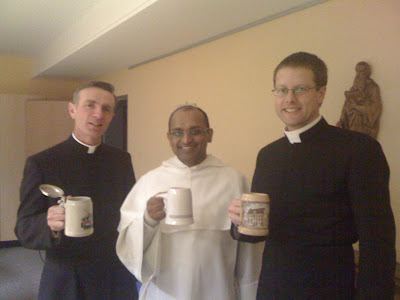Secretary to the Pontifical Council for Legislative Texts,
preaches at the Mass.
preaches at the Mass.
I have just returned from the Seminary of the Fraternity of St Peter in Wigratzbad in Bavaria, having been invited for the conferral of the Minor Orders on a number of the seminarians. The Seminary is part of an extensive site that is a place of Marian pilgrimage. The seminary uses the large modern chapel on the pilgrimage site for it's larger liturgical functions (the halo of rays emanating from the tabernacle refer to part of the apparition which you can read about here) although they also have a house chapel for daily use. So successful has the seminary proved that an extension was opened in 2000 by Cardinal Castrillion Hoyos to house the present number of 80 seminarians.
I managed to sit in the Rector's place in the refectory on the first day there, thus finding myself in pleasant conversation with the Superior General of the Fraternity, Fr John Berg - an urbane American. It was an example of the kindness and hospitality that is extended to all guests that the Rector, Fr Banauch, just sat to the other side of me and I remained in blissful ignorance of my blunder.
The weather was lovely looking out through the windows but the temperatures reached -10, however that didn't prevent a three hour ceremony and Mass (in a well-heated church, I'm glad to say) for the conferral of Minor Orders. I especially liked the ritual connected with Ostiarius, where the 13 students receiving it were led out of the church and each one ceremoniously locked and then unlocked the church doors before processing around the outside to another entrance to be admitted by each one ringing a bell at the doorway. Locking and unlocking the church is now for them for the next year a part of their practical duties.
Also of interest were the words of the admonitions for the subdeacons, who are given detailed instructions on the manner of caring for chalices and washing the linens. (I recalled that the document "Redempionis Sacramentum" - in para 120 - reminded clergy of their praiseworthy duty to rinse the purificator in the sacristy sacrarium before entrusting it to others for the usual forms of washing.)
Having spent a few days there I was struck by the high calibre of the men training at the seminary. I was unfailingly greeted with warmth, kindness and politeness and for anyone still labouring under the caricature of young people interested in Tradition as as an odd type of 'young fogey' a visit to this seminary would soon dissuade anyone from that opinion.
For any of the men who occasionally talk to me about the possibility of testing a vocation, I can recommend you go and visit St Peter's if what you're looking for is a formation faithful to the Church's teaching, sound and yet kind in it's personal and spiritual formation and cheerful and full of charity in it's practice of the Faith.























4 comments:
ostiarius is the spelling i think
frater in exilum
I wonder if a traditional seminary (order?) such as this could be set up in England. It would certainly be a blessing for this country and there would be no shortage of vocations!
It's good to see that the minor orders are still supported by this Order. Would that we could have more of them.
It would mean that EMHCs, - with their unanointed hands - would no longer be required, even on those rare occasions, which I personally have never come across, of large crowds and shortage of priests.
Yes it would be good also for more english and irish vocations to the traditional orders. I am hoping one day to become a priest in the fssp
Post a Comment